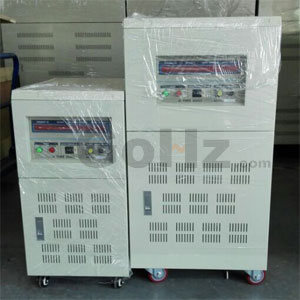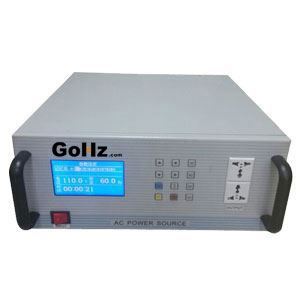Home » Three Phase Converter » Difference between 50Hz and 60Hz to run a motor
Difference between 50Hz and 60Hz to run a motor
The output power at any speed is fundamentally related to the torque that the motor can produce. Since the torque is determined by the machine parameters and these don't change (if the flux remains constant as described) - then the maximum torque and rated torque will not change. The torque is a product of conductor current and air-gap flux density, and these will of course remain constant whether the motor is driven at 25 Hz, 50 Hz, 60 Hz, or even 100 Hz. In practice - one can normally increase flux densities at lower frequencies, because the core losses are lower for the lower frequencies. The opposite also applies in that the flux densities at higher frequencies need to be reduced somewhat to not cause too high core losses.
Since Power = Torque x Speed, the same motor will be able to produce approximately twice the power at 100 Hz that it will at 50 Hz - assuming of course it can rotate safely at that speed.
The cooling operates better at higher speeds but this is not the reason why one can increase motor 'rated' output power as speed or applied supply frequency is increased. It is more fundamentally because Power = Torque x Speed, where a motor's torque is largely determined by its physical parameters.
It emphasizes also that it is very desirable to contact the motor manufacturer with questions like this. All of the general guidelines are correct and generally true but much depends on the motor design as stated. The manufacturer has design data making it very easy to answer this question, likely doing this every day. The difference between 50Hz and 60Hz power supply usually 20% - nominal power at 60Hz higher by 20% of 50Hz power supply. The data can be found on motor nameplate.
Being one of those people for many years I can say that induction motors are often designed conservatively, especially older motors. It is not uncommon for some motors to run satisfactorily at the same voltage both 50Hz and 60Hz. Yes performance is different but may be acceptable. Consider also that motors often run at less than full load in applications resulting in lower conduction losses and therefore higher induction losses may be OK. This difference between theory and practice can be a bit frustrating at times but we try to help customers while keeping them out of trouble. Note however when you start talking large changes in frequency like running at 100 Hz or 120 Hz there are many more things to consider and this definitely should not be attempted without consulting the manufacturer or a lot of experience allowing one to analyze the machine themselves.
Since Power = Torque x Speed, the same motor will be able to produce approximately twice the power at 100 Hz that it will at 50 Hz - assuming of course it can rotate safely at that speed.
The cooling operates better at higher speeds but this is not the reason why one can increase motor 'rated' output power as speed or applied supply frequency is increased. It is more fundamentally because Power = Torque x Speed, where a motor's torque is largely determined by its physical parameters.
It emphasizes also that it is very desirable to contact the motor manufacturer with questions like this. All of the general guidelines are correct and generally true but much depends on the motor design as stated. The manufacturer has design data making it very easy to answer this question, likely doing this every day. The difference between 50Hz and 60Hz power supply usually 20% - nominal power at 60Hz higher by 20% of 50Hz power supply. The data can be found on motor nameplate.
Being one of those people for many years I can say that induction motors are often designed conservatively, especially older motors. It is not uncommon for some motors to run satisfactorily at the same voltage both 50Hz and 60Hz. Yes performance is different but may be acceptable. Consider also that motors often run at less than full load in applications resulting in lower conduction losses and therefore higher induction losses may be OK. This difference between theory and practice can be a bit frustrating at times but we try to help customers while keeping them out of trouble. Note however when you start talking large changes in frequency like running at 100 Hz or 120 Hz there are many more things to consider and this definitely should not be attempted without consulting the manufacturer or a lot of experience allowing one to analyze the machine themselves.
I have surface grinding machine in which spindle wheel motor 240v,3ph,10kw,100hz,1445rpm 43amps driven by ac generator now generator gets defective can we start this motor with 50hz 3ph variable auto transformer at 240v,50z please suggest method of starting without generator machine is made in Germany
I have bought a machine that is meant to work in 60Hz frequency, in our country all plugs works on 50Hz. Do you think this converter would solve my problem to convert the frequency from 60 to and make the machine work efficiently?
Je possède un groupe électrogène qui fourni du 230v en 60 hz venant des USA. Je souhaite installer des prises en 220 v avec une fréquence en 50 hz pour une de mes machines qui ne supporte pas le 60 hz.
J'ai besion de 3000 watts.
Y a t il une solution?
J'ai besion de 3000 watts.
Y a t il une solution?
Post a Comment:
You may also like:
50Hz 60Hz Frequency Converter Setting
Using GoHz frequency converter to
Or customize your own converters.
- Convert 220v 50Hz to 110v 60Hz,
- Convert 120v 60Hz to 230v 50Hz,
- Convert 110v 60Hz to 240v 50Hz,
- Convert 480v 60Hz to 380v 50Hz,
- Convert 400v 50Hz to 460v 60Hz,
- Convert 240v 60Hz to 380v 50Hz,
Or customize your own converters.
Featured Articles
460v 60Hz motor on 400v 50Hz power ...
 Often the European motors at 1hp size are universal for 50Hz or 60Hz power supply, as long as you have 400V x 50Hz and 460V x ...
Often the European motors at 1hp size are universal for 50Hz or 60Hz power supply, as long as you have 400V x 50Hz and 460V x ...
 Often the European motors at 1hp size are universal for 50Hz or 60Hz power supply, as long as you have 400V x 50Hz and 460V x ...
Often the European motors at 1hp size are universal for 50Hz or 60Hz power supply, as long as you have 400V x 50Hz and 460V x ...Convert 220v, 230v, 240v 50Hz to 110v, ...
 When you buy an 110v (120v) 60Hz appliance from USA, and run it on 220v (230v, 240v) 50Hz country (i.e. UK, Australia, ...
When you buy an 110v (120v) 60Hz appliance from USA, and run it on 220v (230v, 240v) 50Hz country (i.e. UK, Australia, ...
 When you buy an 110v (120v) 60Hz appliance from USA, and run it on 220v (230v, 240v) 50Hz country (i.e. UK, Australia, ...
When you buy an 110v (120v) 60Hz appliance from USA, and run it on 220v (230v, 240v) 50Hz country (i.e. UK, Australia, ...60Hz motor running on 50Hz power ...
 Electric motors, both single and three phase, are designed for running on a specified power frequency. But sometimes we may use a ...
Electric motors, both single and three phase, are designed for running on a specified power frequency. But sometimes we may use a ...
 Electric motors, both single and three phase, are designed for running on a specified power frequency. But sometimes we may use a ...
Electric motors, both single and three phase, are designed for running on a specified power frequency. But sometimes we may use a ...
I have a 4pole, 50hz, 185kw motor driving a large VTP pump, the manufacture of the motor have said the motor can run up to 60hz (name plate 50hz) however once increased to 51hz and beyond there is a resonant vibration appearing in the motor terminal box causing major damage. Am I right in thinking if a motor is designed for 50Hz all natural frequencies are set beyond? Is it possible there could be a natural frequency between 50Hz & 60hz? (terminal box/connections).
Thanks in advance.